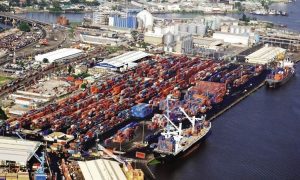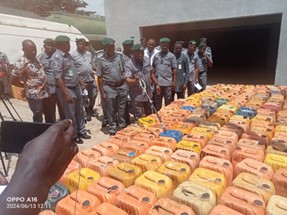
Vincent Toritseju
Lagos — A former Executive Director of the Nigerian Shippers’ Council, NSC, Mrs. Dabney Shahollma, has said that data from Nigerian institutions particularly in the maritime sector, are not verifiable.
She also said the ports infrastructure is not competitive against what exist in neighboring West African countries.
Speaking at the just concluded Nigerian Ports, Trade and Investment Forum held in Lagos, Shahollma said she has to consult other sources to get the true data she wanted.
“There was a time I needed to establish the measurement of some quay aprons that terminal operators have been allotted and I had to physically get engineers and surveyors to take the measurements for me because I got four sets of data from the Nigerian Ports Authority, NPA, and they were all wrong. But at physical measurement, I was able to establish what the measurements were and because unless you do that you cannot ascertain what kind of vessel is supposed to come in otherwise you can run into a serious problem.
“This has also led to issue of freight rates because no shipping company will allow its vessel steam into Nigerian ports without additional cost,” she said.
So automatically there is a 35 per cent margin mark up, because when the vessels come there are no fenders, and what does that means, the vessel comes alongside, and she is brushed. By the time the vessel finishes operation and steams out, she is looking for the next repair yard to fix her hub, sometimes the stumps, sometimes the bull box, they are broken.
“When we go for trade and freight negotiations this is what the shipping companies say. The extenuating factors for trading into Nigeria is extremely risky. So, there is already a markup.
“You cannot compare your freight with Benin neither can you compare your freight with Togo or Lome in Togo because every facility needed for a deep seaport in Lome is there, including the security because they are on the radar, and they have a system that is detecting everything like their drones and their sensors.
“So, people are comfortable sailing in and sailing out of their ports. So, what a Ghanaian would demand and negotiate when I go for negotiations and Ghanaians are around the table, I keep quiet because the facts are given to you, and you can clearly see that a person who is trading into Nigeria is trading at a disadvantage so you must allow him to put up that mark up and the mark up is consistent. The surcharge that these companies slam on Nigeria is cost recovery and there is nothing you can do about that because the infrastructure are not there.”



